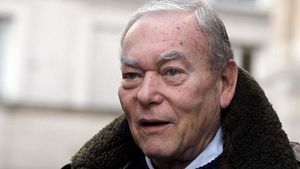On April 3, 2025, the world of business and geopolitics was rocked by the announcement of tariffs by the U.S. government under President Donald Trump. This decision, described by the British magazine The Economist as "the most profound, damaging and unnecessary economic error of the Modern Era," sent shockwaves through financial markets globally, leading to a wave of uncertainty and reactions from various countries.
In Brazil, however, the reaction was mixed. The Ibovespa index, which had fluctuated throughout the day, closed with a slight decrease of 0.04%, settling at 131,140.65 points, a loss of just 49.69 points. At its peak, the index reached 132,500 points before dipping into negative territory. The commercial dollar, on the other hand, experienced a significant drop of 1.23%, closing at R$ 5.629, reflecting a broader decline of the U.S. dollar worldwide.
Despite the global turmoil, Brazil's response to the tariffs appeared somewhat optimistic. Analysts noted that the tariffs imposed on Brazil were less severe compared to those on other countries, such as China, which faced a staggering 54% tariff on many products. This relative leniency sparked discussions about potential opportunities for Brazilian exports, particularly in the agricultural sector. Fernando Ferreira, chief strategist at XP, pointed out that sectors exporting commodities could benefit from a trade war, and there was an expectation of increased Chinese investment in infrastructure in Brazil and Latin America.
However, the effects of the tariffs were felt acutely in the stock market. Shares of major companies like Vale (VALE3) and Petrobras (PETR4) plummeted, with Vale losing 3.62% and Petrobras dropping 3.32%. The broader energy sector was also affected, with junior oil companies like Brava (BRAV3) suffering a significant decline of 7.18% as the OPEC+ announced plans to increase oil production.
In contrast, Brazilian banks managed to thrive amid the chaos. Itaú Unibanco (ITUB4) and Bradesco (BBDC4) saw gains of 1.78% and 1.92%, respectively, as investors anticipated a potential influx of foreign investment due to the tariff situation. Retailers also benefited from falling interest rates, with Magazine Luiza (MGLU3) rising by 5.45% and Lojas Renner (LREN3) increasing by 2.24%.
As the global markets reacted to the tariff news, the U.S. stock indices suffered their worst one-day losses since 2020, with the Dow Jones falling by 3.98%, the S&P 500 by 4.84%, and the Nasdaq plummeting by 5.97%. The Federal Reserve warned that the tariffs could lead to "widespread disruptions" in key sectors of the U.S. economy, projecting a potential contraction of 1% in global trade volumes.
In response to the tariffs, Canada announced limited measures, including a 25% tariff on vehicles imported from the U.S. that do not comply with the North American trade agreement. Prime Minister Mark Carney criticized Trump's tariffs as a "tragedy for global trade," emphasizing that the U.S. should reconsider its approach.
Meanwhile, the situation escalated further as China declared its intention to impose additional tariffs of 34% on U.S. products starting April 10, 2025. This move heightened fears of a global economic recession, with JPMorgan raising the risk of such an outcome from 40% to 60%. Bruce Kasman, the bank's chief economist, stated that the full implementation of Trump's policies represents a substantial macroeconomic shock that could lead to a recession in both the U.S. and potentially the global economy.
As the trading day progressed, the volatility in the markets was palpable. Bitcoin futures dropped by 3.15%, reflecting the broader trend of asset liquidation as investors sought safety amid the uncertainty. The trading volume on the Ibovespa exceeded R$ 28.30 billion, highlighting the heightened activity as traders reacted to the unfolding situation.
Looking ahead, the Brazilian government, led by President Luiz Inácio Lula da Silva, vowed to take all necessary measures to defend its economy. Lula stated that the response to the U.S. tariffs would be based on a reciprocity project approved by Congress, emphasizing the importance of multilateralism and free trade.
In the coming days, the focus will shift to the U.S. labor market, with the release of the payroll report—an essential indicator for the Federal Reserve—expected to further influence market sentiment. As global markets brace for the fallout from the tariffs, the question remains: who will be left to pick up the pieces?
As the situation develops, analysts and investors alike will be watching closely for signs of how countries respond to the escalating trade tensions. The implications of these tariffs could reshape international trade dynamics and influence economic policies worldwide.




